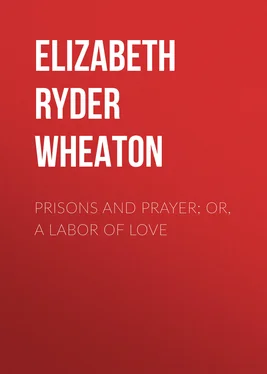Elizabeth Ryder Wheaton - Prisons and Prayer; Or, a Labor of Love
Здесь есть возможность читать онлайн «Elizabeth Ryder Wheaton - Prisons and Prayer; Or, a Labor of Love» — ознакомительный отрывок электронной книги совершенно бесплатно, а после прочтения отрывка купить полную версию. В некоторых случаях можно слушать аудио, скачать через торрент в формате fb2 и присутствует краткое содержание. Жанр: foreign_antique, Культурология, sociology_book, на английском языке. Описание произведения, (предисловие) а так же отзывы посетителей доступны на портале библиотеки ЛибКат.
- Название:Prisons and Prayer; Or, a Labor of Love
- Автор:
- Жанр:
- Год:неизвестен
- ISBN:нет данных
- Рейтинг книги:4 / 5. Голосов: 1
-
Избранное:Добавить в избранное
- Отзывы:
-
Ваша оценка:
- 80
- 1
- 2
- 3
- 4
- 5
Prisons and Prayer; Or, a Labor of Love: краткое содержание, описание и аннотация
Предлагаем к чтению аннотацию, описание, краткое содержание или предисловие (зависит от того, что написал сам автор книги «Prisons and Prayer; Or, a Labor of Love»). Если вы не нашли необходимую информацию о книге — напишите в комментариях, мы постараемся отыскать её.
Prisons and Prayer; Or, a Labor of Love — читать онлайн ознакомительный отрывок
Ниже представлен текст книги, разбитый по страницам. Система сохранения места последней прочитанной страницы, позволяет с удобством читать онлайн бесплатно книгу «Prisons and Prayer; Or, a Labor of Love», без необходимости каждый раз заново искать на чём Вы остановились. Поставьте закладку, и сможете в любой момент перейти на страницу, на которой закончили чтение.
Интервал:
Закладка:
You and I, reader, must do our part in reforming a lost world, in saving lost sinners. Then let us remember how good God has been to us by keeping us out of prison, by keeping us out of the evil surroundings and influences that might have brought us there. Let us give the poor prisoners a fair show and fair play. Many of them long for better things, for one more chance to prove themselves worthy of the confidence and sympathy of their fellow men. After twenty years of toil among those who are bound, I do bless God that He ever called me to carry to those in prison the glad message of His love and seek by love and faith and prayer to lift them up to better things.
PREPARED TO DIE
Once while holding services in a prison, there came to me a prisoner saying, "Mother, I want to tell you I was saved since I saw you." (Only a few days previous.)
Then he told me that he was under sentence of death and that he was so troubled that he cried to God to forgive his sins and pardon his crime, and that God had forgiven him and that he was now prepared to die. He said that when the Lord forgave him he was so happy that the officers put an extra guard over him, thinking that he had suddenly lost his mind.
I exhorted him to maintain his faith in God and never doubt His saving power; to walk softly before God; to keep humble and meek and pray much. Truly there is pardon for every sinner who, in the depths of his soul, repents of his sin. God's love and power are so great that He will save to the uttermost all that come unto Him, not willing that any should perish.
Reader, perhaps you have not the opportunity to know these souls as I know them, and so to help you understand them I give in other chapters many extracts in their own words, taken here and there from the thousands of letters I have received. I believe this will help you to understand that hundreds, shut out from the companionship of their fellow beings, are as easily moved by kindness, as capable of gratitude, as easily won to repentance, as willing to give up sin, as thousands of those outside, who perhaps have never been tempted as they were tempted and have never fallen as they have fallen. In quoting from these letters few changes have been made, except in spelling, capitalization and punctuation.
Some young souls are making, for a stated time,
This, their maiden effort, on the sea of crime.
Oh, Christians, teach them early what to me is plain;
Crime ever has and ever will result in lasting pain.
Do not be too lenient, nor too soon forgive,
Lest all vice should flourish and no virtue live.
Society demands it, the guilty should atone—
But take care you punish those, and those alone !
Keep them in your prison till by virtue shown
They will know what is and what is not their own.
But let all be careful lest by word or act
Those who should reform them from their good subtract.
Rule them wisely, gently—by some humane plan,
All their faults to conquer as best becomes a Man.
When your work is finished and their habits changed,
Give them honest labor, by the State arranged;
Show them honest labor can a living gain,
While the social outcast harvests want and shame !
Treat them fairly, kindly; teach them all the true
Will be friendly with them while the right they do.
Both principle and policy declare this course is wise;
Then why longer act the fool and wisdom's voice despise?
Crime never can nor will decrease until in Wisdom's School
Men learn the noted lesson, "Right through Law should Rule."
CHAPTER IV.
A Brief Pen Picture of Prison Life
For the instruction of children and others who have never visited one of our large penitentiaries I insert the following sketch of such a visit written by Mrs. F. M. Lambert, author of "Holy Maternity," which was written for this work:
The prisons and buildings connected with them are enclosed by a high stone wall. Of course there is a gate, or gates, opening upon driveways leading into the yard where the shops are located. The gate is securely locked and guarded, the guard having a little room built on the wall over the gate. There is a main entrance to the building through which criminals as well as visitors enter. The officer closes and locks the large door behind you upon entering. On Sabbath mornings many things are seen and heard there. The officers come in and take up the work of the day. The warden or deputy takes a large bunch of keys and opens a side door that leads into the cell room, and the guards follow him into the corridor. Soon is heard the rattling of the keys, and the opening and closing of heavy doors, followed by the tramp, tramp, of many feet. Passing out at a side door with the officer, you may watch the men passing down to their breakfast in the dining-room, which is on the ground floor of the chapel, perhaps one hundred feet from the prison building.
Each guard marches with his company of men, from twenty to fifty in number. They march in single file, each man with his right hand resting upon the right shoulder of the man in front of him.
The officers wear dark blue uniforms, while the convicts are dressed in suits made of heavy woolen goods, generally striped, the stripes being black and white, a little over an inch wide, even the caps being striped, and of the same material as the suits.
You follow the officer across the yard, and notice the large greenhouse with its beautiful plants, flowers and shrubs. But, looking back, you see the great high wall of the prison, and remember that the little spot in the prison yard and the sky overhead is all the glimpse of the world that these poor men get, and, no doubt, is all that some of them ever will get, for some of them are shut in there for life.
THE CHAPEL SERVICE
You follow the officer up the steps of stone into the entrance hall, and watch the men pass out of the dining-room up the stairway into the chapel; then you follow and are led to a seat near the pulpit, facing the assemblage. Your eyes wander quickly over that strange lot of from two hundred to five hundred men, and, in some prisons, over a thousand constitute the audience. When all are seated, the guards seat themselves on high stools placed along the sides of the room, facing the rear door, while the prisoners face the pulpit at the farther end of the room.
Then the prison choir sings and the organ peals forth its beautiful strains, the prisoners joining in the singing. You cannot keep back the tears as you look into their faces and think that only for sin they might be free. Verily, "the way of the transgressor is hard." Prayer is offered, and the chaplain, and those who have permission, talk from the written word of eternal life. Invariably your eyes sweep over that strange audience, and here and there you see a man, or perhaps a young boy, in tears, and you know the tender chord in their hearts has been touched. God grant it may be so! Several testify to hope in Christ.
Services over, the prisoners are marched to their cells and locked in. They must all attend the morning service, but are not compelled to attend the Sunday school in the afternoon. Few prisons conduct Sunday schools. In the afternoon, in company with the chaplain and some of the guards, you may visit the cell rooms, and are allowed to distribute papers and tracts, and speak personally with each prisoner.
The cell room is a long room with a stone floor and whitewashed walls, the cells running through the middle of its entire length. The cells are narrow, little rooms, perhaps four feet wide and six or seven feet long. They vary somewhat in size. They have doors of strong bars of iron, and no windows. All the air received must enter through this grated door in front. The back of each cell joins with the back of the row of cells on the other side, thus forming a double row facing in opposite directions.
Читать дальшеИнтервал:
Закладка:
Похожие книги на «Prisons and Prayer; Or, a Labor of Love»
Представляем Вашему вниманию похожие книги на «Prisons and Prayer; Or, a Labor of Love» списком для выбора. Мы отобрали схожую по названию и смыслу литературу в надежде предоставить читателям больше вариантов отыскать новые, интересные, ещё непрочитанные произведения.
Обсуждение, отзывы о книге «Prisons and Prayer; Or, a Labor of Love» и просто собственные мнения читателей. Оставьте ваши комментарии, напишите, что Вы думаете о произведении, его смысле или главных героях. Укажите что конкретно понравилось, а что нет, и почему Вы так считаете.











